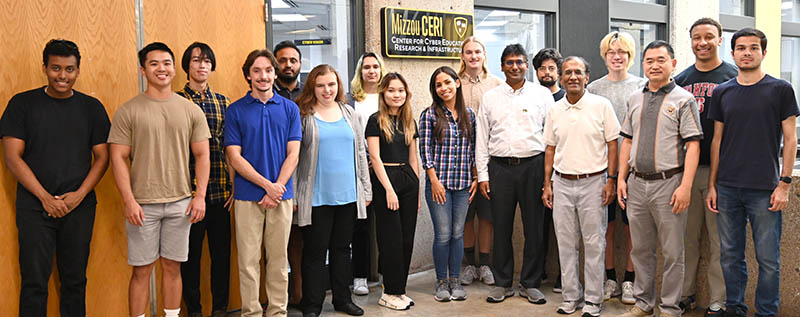July 31, 2023

Undergraduate students from across the country spent 10 weeks at Mizzou Engineering this summer conducting research around technologies such as artificial intelligence (AI), computer vision, cybersecurity and large language models like ChatGPT.
It’s part of the Research Experiences for Undergraduates (REU) in Consumer Networking Technologies, a program funded by the National Science Foundation designed to help undergraduate students explore research. The goal is to allow them to solve open-ended research problems following a guided program and to give them a glimpse of graduate school, said Prasad Calyam, Gilliom Professor of Cyber Security and director of the REU.
“I had thought about graduate school before, but this program has solidified that,” said Andrew Zhao, a computer science student at the University of Illinois.
The 10 participants split into two teams to work on ongoing research. They presented their work at the Undergraduate Research and Creative Activities Forum on campus last week.
The Projects
Chatbot Dialog Design for Improved Human Performance in Domain Knowledge Discovery
Team: Zian Zeng, University of Hawaii, and Audrey Vazzana, Truman State University
Zeng and Vazzana worked with Calyam on his KnowCOVID-19 resource that allows researchers to quickly sift through thousands of articles about the coronavirus and retrieve the data they want.
“We developed a large language model similar to a chatbot around COVID using medical data,” Zeng said. “Unlike ChatGPT, which pulls from general data, our data set is focused specifically on medical data.”
The team worked on the retrieval of data based on user query, ranking documents that are most relevant and summarizing the information.
“I’ve learned a lot,” Zeng said. “It was definitely a new experience doing research in this type of pipeline, working from the ground up using different data sets.”
Vazzana agreed, adding she learned how to better read and understand research papers, a skill that will be beneficial in graduate school.
“I’ve learned a lot about how to learn, figure stuff out and use tools and resources provided,” she said.
The team was mentored by graduate student Roland Oruche.
Game Theoretic Approach to Ransomware Attack and Defense using Deception-based Strategies
Team: Tam Dinh, California State Polytechnic University, and Lilliana Marrero Solis, University of Puerto Rico
Dinh and Marrero Solis also worked with Calyam, in this case applying game theory to cybersecurity.
Game theory relates to how people make decisions when interacting with one another.
“It’s about finding the best strategy in multiple scenarios,” Marrero Solis said. “It’s been used in business, and now we’re applying it to cybersecurity, specifically ransomware. I’ve learned a lot about game theory, which is an interesting and complex branch of mathematics.”
In this case, the team applied that theory to analyze behavior and optimize decisions at different stages of a cyber attack, including different deception methods, Dinh said.
“I’ve learned a lot about the process of doing research, collaborating with others and increased my skillset around cybersecurity,” Dinh said. “I’ve thought about graduate school before. Now I have a better idea of what it will be like.”
Graduate student mentors for the team were Roshan Lal Neupane and Kiran Neupane.
Adversarial Detector using Explainable AI for VR Cybersickness Model
Team: Genova Mongalo, University of Missouri-Kansas City, and Matthew Denton, Washington University
Mongalo and Denton worked with Calyam and Assistant Professor Khaza Anuarul Hoque on research around cybersickness.
“Whenever people are using virtual reality, they sometimes experience cybersickness,” Denton said. “There are really interesting AI methods to detect and predict when it’s going to happen, but attackers can misclassify those methods. We’re developing a system to detect when someone is trying to hack it.”
Both Denton and Mongalo said they’ve learned a lot about AI.
“I had a basic knowledge of AI before, but now with the REU, I feel really good about it,” Mongalo said.
The team was under the mentorship of graduate student Ripan Kumar Kundu.
Application of LLMs to Image Segmentation and Object Detection and Classification in Conservation Problems
Team: Andrea Fratila, Mizzou, and Andrew Zhao, University of Illinois
Fratila and Zhao worked with Professor Yi Shang on his ongoing research to detect and classify waterfowl in images.
Shang is developing a system that automatically identifies individual birds in photos of thousands of birds in a flock. The work is in partnership with the Missouri Department of Conservation, which historically has had to manually count individual birds in order to track habitat activity.
“We take classifier data and feed it into ChatGPT for readable results,” Fratila said. “The idea is to streamline the process and eliminate busywork.”
Fratila, who was already considering graduate school, said she’s benefited from the REU.
“I’ve worked on projects by myself but I’ve learned about working in a team and speaking up and getting help when I need it,” she said.
This type of project was new to Zhao.
“I didn’t know about reviewing literature before implementing your own processes,” he said. “That was interesting.”
Omniverse for 3D Modeling and VR
Team: Dylan Chapell, Colorado College, and Edward Shang
Chapell and Shang worked with Curators’ Distinguished Professor Kannappan Palaniappan in the CIVA Lab.
“Our project was in the field of computer vision, getting computers to see and process the world using 3D reconstructed data sets,” Chapell said.
The team used data from images collected by a drone over Jesse Hall to reconstruct the environment. They considered how to make models best suited for specific applications related to city scale environments, for instance how to restrict what area the system focuses on.
“The research process is new to me, so there was a process of getting up to speed and figuring out the research environment,” Chapell said. “It was a great experience.”
Graduate student mentors were Taci Kucukpinar and Jaired Collins.
Conduct research alongside professors working at the edge of science and technology. Apply today!